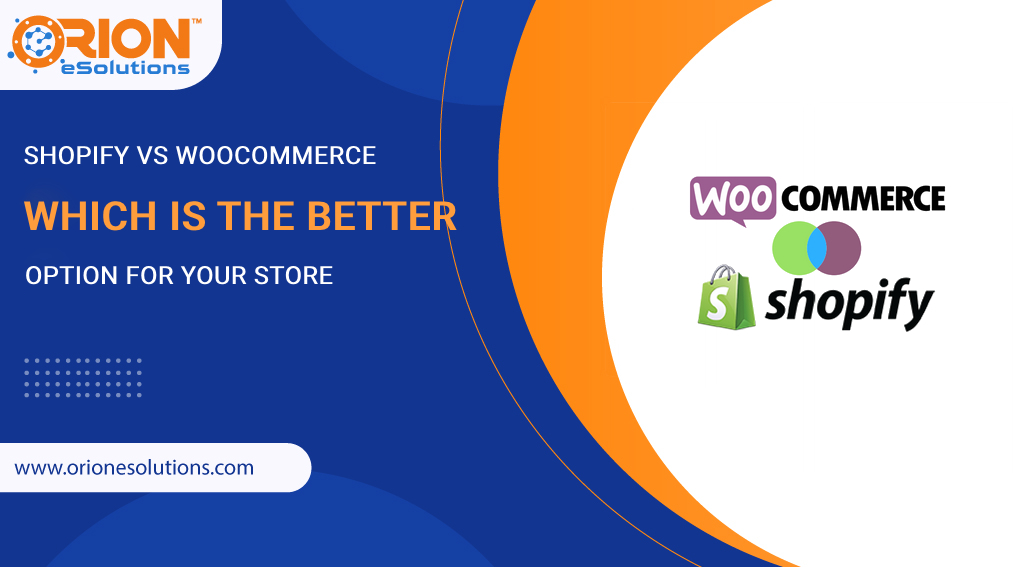Shopify and WooCommerce rank as the topmost solutions when building an online store. Whether it’s the recent pandemic, a business evolution or the fact that technology can do wonders for your business, the reality is that many companies are moving online.
Take a look at these figures that indicate the projected growth in the next few years.
- It is projected that e-commerce sales are projected to touch more than $6.5 trillion by 2023, which is 22% of retail sales, globally.
- Global B2B e-commerce market is expected to increase by 17.5% annually up to 2027
- It’s projected that that 95% of all purchases will be through e-commerce by 2040.
Now that the fact is established that a business should have an impressive online presence, whether it’s a B2B or B2C, let’s assess how you can choose between these two leading platforms.
The platform should cater to your unique requirements. Both Shopify and WooCommerce have excellent features and can be the perfect e-commerce partner for your business. The choice will lie in your needs and skill levels.
We will walk you through both to help you decide on the most suitable platform.
Let’s start with the introduction to both:
Shopify was founded in 2006 and offered a complete eCommerce package with hosting to launch an immediate store, manage inventory and accept payments. First time entrepreneurs and SMEs need not worry about technical aspects like hosting and security. It’s an easy to use platform.
WooCommerce, is an open-source plugin that runs on the WordPress Content Management System (CMS). WordPress accounts for more than 43% of all websites built.
You can install and activate the plugin if you are an existing WordPress user. But, if you don’t have a WordPress site, you need to set it up first, which also means you need to buy hosting. Though you can run WooCommerce on an in-house server, many prefer separate web hosting packages.
At Orion, we understand how vital the choice of a good web hosting provider is. An excellent hosting solution provider can ease the technical worries and focus on store set-up and sales.
So, in a nutshell,
- Both platforms are excellent eCommerce options that offer great features and functionality.
- Shopify is a good choice for those who are new entrants into eCommerce and want an easy to go turnkey solution.
- WooCommerce allows greater control over their eCommerce stores.
Your choice will be biased towards the pricing models and the deliverables you get on them.
Let’s dive a little deeper and assess some other parameters:
Usage Statistics
- WooCommerce powers 1.5 million active online stores.
- Shopify powers around 3.7 million online stores.
Aesthetics
Shopify themes are professionally designed by designers and give your store the look it needs. Shopify offers free and priced themes, and depending on what you like and need, you can choose.
WooCommerce works on WordPress, which means that you have access to unlimited free and premium design options. woocommerce can be integrated into any theme as a plugin and as standalone theme access to other plugins giving you many in site features and template varieties
Pricings:
The WooCommerce plugin is free to use. Any extensions are extra and are usually a monthly or yearly subscription. You need to purchase the hosting.
The Shopify basic monthly package starts at $29 and goes up to $299. Depending on your requirements, you can upgrade to Shopify Plan, Advanced Shopify Plan, or Shopify Plus. Under the basic plan, you can add two user accounts and have unlimited file storage. However, third-party tools and add-ons are additional.
The upfront costs with WooCommerce are less, but this can shoot up if you start purchasing premium themes and plugins. An assessment by an experienced service provider like Orionesolutions can help you with predictive analysis of your requirements.
Features
Both Shopify and WooCommerce have an envious range of features. While Shopify features are more instant and ready to use, you can download just about any plugin WooCommerce that gives you the feature you’re seeking. Shopify also caters to developers by providing CSS, HTML, and Liquid access.
SEO
WordPress is the most preferred blogging platform, which is good for SEO, and this gives WooCommerce an edge. Good blogs with the right keywords can rank well in searches which can boost eCommerce sales.
Customer Support
Shopify offers extensive customer support via phone, email, or chat. WooCommerce, however, does not have dedicated customer support. However, you can get support on their forums and from the developers.
So which one should you choose?
Choose Shopify if:
- If you are seeking an eCommerce store up and running fast with minimal effort
- If you’re seeking a turnkey approach
- If you depend on extensive customer support
- If you can pay for the features and services
- If you’re not into the technical aspects but want a well-designed and functioning website
Choose WooCommerce if:
- If you want tighter control over your store
- If you want the benefits of numerous site designs and plugins.
- If you can manage without on-call customer support and refer to the open forums for help
- If you can handle the setting up of the store.
- If you have a low budget.
- If you have an existing WordPress site.
Key Takeaway
Both are the preferred eCommerce platforms being used by thousands across the globe. Shopify is a more simple, ready to go solution and you don’t need to control every aspect of the website process. WooCommerce is relatively more complex but gives you more control, making it easier for technical users.
The real trick lies in assessing your current requirements, your target markets, shipping and payment methods and factoring in your future needs. An expert technology partner like Orion eSolutions can effectively counsel and guide you on the best platform and develop your store with all features and plugins at the most cost-effective prices.
So, what are you waiting for? Grow your business with Orion e-commerce services.









